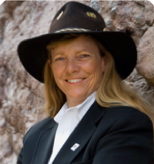This post was written by Henry Vogt ’19
“Hunter is disruptive” is the phrase we first saw as we walked into our second guest lecturer of the semester.
 Earlier this Fall we had the pleasure of hosting guest speaker Hunter Lovins. Suffice it to say, she knocked our socks off. I had heard Hunter’s name before, but wasn’t very familiar with her work or legacy. It became apparent right away that we were in for a unique and inspiring experience.
Earlier this Fall we had the pleasure of hosting guest speaker Hunter Lovins. Suffice it to say, she knocked our socks off. I had heard Hunter’s name before, but wasn’t very familiar with her work or legacy. It became apparent right away that we were in for a unique and inspiring experience.
Hunter’s body of work in sustainability and climate justice is prolific: from starting numerous influential non-profits, creating successful sustainable MBA programs from scratch, authoring best selling books, founding impact investing firms, and consulting with some of the largest corporations in the world including Unilever and Walmart, Hunter’s influence is extensive. This is augmented by her down-to-earth, Colorado ranch-style demeanor. She tells it like it is, passionately, in an inspirational way. She’s the type of person that understands that solving world problems is best facilitated over a whiskey, face-to-face. Hunter also owns a beautiful ranch in Colorado, where she easily could spend all of her time but instead chooses to be on the move, committed to her mission.
I asked Hunter how she envisions American capitalism evolving and whether she believes it has the capacity to solve the massive challenges facing our planet under current frameworks. She answered by giving a prediction from economist Tony Sebens: “Within 10 years, economics will dictate that the world will be 100 percent renewable. For this to happen, the world’s economy will be disrupted. This will be the ‘Mother of all disruptions.’ In other words, to save the climate we have to crash the global economy.”
If this is, in fact, the case, then the next decade will be tumultuous to say the least. This led our class session to focus on the question of what’s next and how do we collectively begin to prepare for this disruption. While this notion and idea can admittedly be not very uplifting, it was encouraging to hear suggestions from many of my classmates on how we may leverage our global economy and invest in Base of the Pyramid projects to find solutions and begin to strategize on how we may “soften the landing” from major global disruption.
Overall, having Hunter present to us was inspiring and eye-opening. While there are massive challenges ahead, having individuals like Hunter who are disruptive, driven, and committed to finding solutions to these challenges provides hope for the future.
